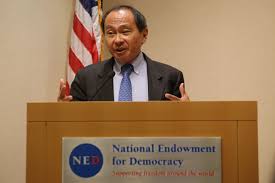A new white paper titled “Global Populisms and Their Challenges,” by Anna Grzymala-Busse, Didi Kuo, Francis Fukuyama and Michael McFaul explores how mainstream political parties are the key enablers of populist challenges—and the key solution, the Freeman-Spogli Institute’s Alice Wenner writes.
“Currently, developed democracies run the risk of erosion by domestic populists and successful attacks by international authoritarians,” the authors observe. “To protect our democracy, we need to reclaim the rule of law, emphasize the importance of a broad national community, and underscore informal democratic values and norms.”
 Populists threaten democracy in three distinct ways, they suggest: by eroding formal institutions, by redefining “the people,” and by undermining the values and norms that underpin successful democracies. These threats to democracy follow directly from the very thin, but intense, ideological commitments of populists—to dismiss the status quo elites and to (allegedly) represent the people, the report states:
Populists threaten democracy in three distinct ways, they suggest: by eroding formal institutions, by redefining “the people,” and by undermining the values and norms that underpin successful democracies. These threats to democracy follow directly from the very thin, but intense, ideological commitments of populists—to dismiss the status quo elites and to (allegedly) represent the people, the report states:
- First, populist movements and politicians tend to disdain formal democratic institutions, such as courts, legislatures, regulatory agencies, and oversight. These are the critical features of the rule of law that can hold populists accountable or remove them from power. In contrast, populists view this architecture of the state as unnecessary and obstructive creations of corrupt and self-serving elites. As a result, they openly disparage and try to undermine these institutions…
- Second, to represent “the people,” populists first have to define them—and, by default, also label and exclude others. In practice, this designation paves the way for attacking and discounting vulnerable groups, such as ethnic or religious minorities, immigrants, or lower-income populations. The result often produces a populist conception of democracy as majority rule without minority rights…..
- Third, populists undermine the informal norms and values critical for liberal democracies to
flourish. As identified by political scientists Steven Levitsky and Daniel Ziblatt, two of these
norms are forbearance (i.e., restraint in exercising institutional prerogatives) and tolerance
(i.e., the acceptance of opposition and criticism). ….. Yet instead of exercising this self-discipline, populists erode the informal norms of democracy…..

Former NED board member Francis Fukuyama
The introduction of the internet and disinformation has contributed to the rise of populism in a big way, said Fukuyama (right). “On the internet, one fact is as good as any other fact, even if it’s not true. And I think that’s a direct way in which unmediated channels of communication become instruments for further undermining elite control.”
The best way to think about and explain populism is by using the “us versus them” mentality, said Grzymala-Busse. “It’s about the way you draw boundaries around who’s a legitimate part of the electorate and who’s not, and which leaders are doing something for you and which ones aren’t,” she said.







